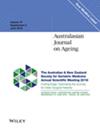The representation of Australians living with dementia in voluntary assisted dying research: A scoping review
Abstract
Objectives
To critically examine which stakeholders are participating in voluntary assisted dying (VAD) research, to identify the representation of Australians living with dementia.
Methods
A scoping review of peer-reviewed literature to examine which stakeholders are represented in Australian VAD research was conducted. This review was informed by the Arksey and O'Malley Framework for Scoping Reviews, and the Preferred Reporting Items for Scoping Reviews (PRISMA-ScR). Searches were conducted systematically across key academic databases to gather Australian research articles written in English that were published between 2017 and August 2023.
Results
After screening, 21 publications formed the dataset. Of the 21 publications, none of them represented Australians living with dementia. The voice of one person living with a terminal illness was included in a study of care partners, and four studies explored the views of community members. The most dominant voices in the dataset were health-care practitioners, who were represented in 16 studies.
Conclusions
Australian VAD research is a contested space where all stakeholders with a relevant contribution to policy and practice must be represented in contemporary Australian research. As living experience experts with a wealth of experiential knowledge to contribute, the voices of people living with dementia need to be represented in future Australian VAD research through inclusive research design, to ensure a greater balance in stakeholder representation across the VAD literature.


 求助内容:
求助内容: 应助结果提醒方式:
应助结果提醒方式:


